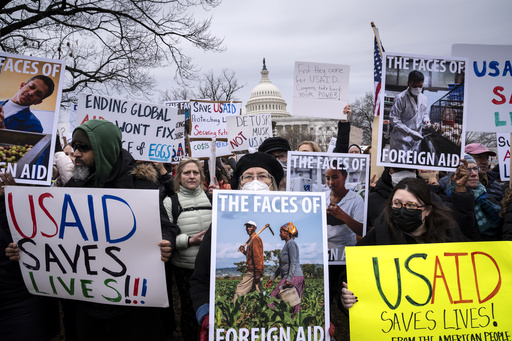
Frustration surged among supporters of the U.S. Agency for International Development (USAID) during a rally in Washington on Wednesday. Concurrently, aid workers operating in various countries scrambled to disband their homes and personal affairs after a sudden directive from the Trump administration that required nearly all agency personnel to cease their duties globally.
This directive, issued on Tuesday, came after a series of actions in the preceding weeks by the Trump administration and its backers, including billionaire Elon Musk, which systematically dismantled aspects of USAID. The agency has played a crucial role for over six decades, particularly in enhancing U.S. security through educational initiatives, combating health crises, and other developmental efforts abroad.
Marco Rubio, the Secretary of State, who was on his inaugural visit to Central America, justified the abrupt changes and indicated a preference for a more organized approach. He expressed that the administration intends to reevaluate U.S. aid programs, categorizing them based on their alignment with national interests, stating, “This is not about ending foreign aid. It is about structuring it in a way that furthers the national interest of the United States.”
However, back in Washington, hundreds of protesters gathered outside the Capitol, demonstrating against the rapid disbandment of this independent federal agency. Democratic Representative Sara Jacobs from California characterized the situation as illegal, deeming it a coup. Senator Chris Van Hollen from Maryland characterized the turmoil as the most corrupt bargain in American history, linking Musk’s backing of President Trump to the destabilization of USAID and other agencies.
The crowd’s anger was palpable as chants of “Lock him up!” filled the air, directed at Musk. Lawmakers expressed frustration at their inability to counter the administration’s aggressive moves against USAID, with shouts urging Congress to “do your job!” Scott Paul, a director at Oxfam America, underscored the significant damage already incurred, explaining that essential components of the global aid system would require rebuilding “from scratch.”
Despite being one of the most affected agencies under the current administration’s budget scrutiny, USAID staff came together in emergency meetings across U.S. embassies worldwide to seek clarification regarding their employment status amidst the upheaval. However, embassy officials reported being left without guidance on how to assist their staff and contractors, particularly local hires, leaving many in a state of confusion and distress.
The repercussions of the shutdown were immediate for contracted employees in volatile regions. One contractor highlighted feeling endangered as communication channels with the U.S. government were severed, leaving families vulnerable and without support. The contractor lamented, “You really do feel cut off from a lifeline,” emphasizing the isolation felt after restrictions rendered them unable to access critical resources.
While the administration assured the safe return of agency employees within 30 days, concerns about potential abandonment lingered, especially regarding those in perilous situations. As most governmental spending was frozen and numerous employees were sidelined, questions loomed over how the administration would manage the prompt relocation of thousands, potentially jeopardizing significant projects in over 120 countries.
In addition to jeopardizing funds destined for security assistance to nations like Ukraine, the mass withdrawal of personnel could halt essential operations in various areas, including clean water initiatives, education, and livelihood support in places impacted by crises. The communication regarding job cessation for USAID personnel indicated that non-essential staff had until Friday midnight to report back—stripping away support for critical programs worldwide.
As the largest humanitarian donor globally, the U.S. typically allocates less than 1% of its budget for foreign assistance, a figure that is notably lower than that of several other nations. Due to the shutdown, numerous deliveries of food and medication, totaling hundreds of millions of dollars, found themselves in limbo at ports. Health programs instrumental in eradicating diseases like smallpox and supporting HIV/AIDS relief ended abruptly, created by the administration’s funding freeze.
The ramifications were stark in countries like South Africa, where the Health Minister urgently sought discussions with U.S. Embassy representatives, expressing dismay over the unanticipated halt to significant funding for their vital national HIV/AIDS program. The U.S. plays a crucial role in funding this program, vital to combating the epidemic within the nation.
Democratic representatives and advocates emphasized that the independent status of USAID, backed by legislative measures, necessitates congressional approval for any cessation of its operations. Advocates from both major political parties argue that USAID’s global work is pivotal in diminishing rival influences and fostering international partnerships.
As uncertainty clouded their future, USAID employees and their families faced heart-wrenching choices amid rumors of impending orders, including the difficult decision of whether to pull children out of school mid-year or part ways with beloved pets, all seemly abandoned as they feared not having enough time to make travel arrangements amidst the chaos.

